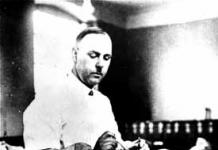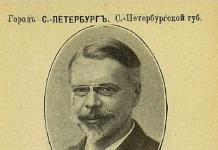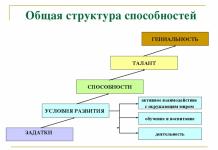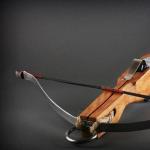From a noble family, a large landowner. Father - Izmail Dmitrievich, was a member of the Tver provincial zemstvo assembly. Mother - Sofya Nikolaevna, nee Ushakova.
Education and early life
He graduated from the natural sciences department of the Faculty of Physics and Mathematics () and the Faculty of Law of St. Petersburg University (). From a young age he was an ardent admirer of A. I. Herzen. In 1876 he volunteered during the war of the Serbs and Montenegrins against the Turks. He later recalled: “In the summer of 1876, I went as a volunteer across the Danube to look for freedom. I kept imagining Lafayette or Kosciuszko. I believed that the cause of Slavic freedom is the cause of Russian freedom.”
Zemstvo figure
Incident with V. A. Gurko
In May 1907, during a speech in the State Duma, F.I. Rodichev spoke in an insulting tone about the behavior of V. A. Gurko, a comrade of the Minister of Internal Affairs (P. A. Stolypin). During this period, Gurko was accused of concluding a secret grain supply deal unfavorable to the state with the merchant Eric Lidval (see Gurko-Lidval case), but the court verdict has not yet been announced. V.I. Gurko publicly challenged Rodichev to a duel, but Rodichev responded that until Gurko was acquitted by the court, a duel was impossible. Then Gurko called Rodichev a coward in print, but received only silence in response. Then Duma deputy V.V. Shulgin stood up for Gurko, who also publicly challenged Rodichev to a duel, but he also did not receive an answer.
On September 17, 1907, according to the verdict of the Judicial Presence of the Criminal Cassation Department of the Senate, V. A. Gurko was dismissed from service on charges of “abuse of power and negligence in the performance of office.”
Incident with P. A. Stolypin
The incident involving F. I. Rodichev and Chairman of the Council of Ministers P. A. Stolypin at a meeting of the Third Duma on November 17, 1907 became widely known. Rodichev’s speech on courts-martial was met sharply negatively by the right-wing Octobrist majority of the Duma and was constantly interrupted by shouts from the audience. In this situation, the speaker began to lose his composure and in one of the passages called the gallows “Stolypin's tie” - an expression that later became popular.
That's why we are defenders of order (laughter in the audience), law and authority... (Noise. Chairman's call) Yes, gentlemen, I will tell you more: at a time when the Russian government was in the struggle against the excesses of the revolution, they saw only one remedy, one palladium in what Mr. Purishkevich calls the Ant’s collar and what his descendants will perhaps call the Stolypin tie ... (Deafening and prolonged noise, exclamations: “Enough! Enough! Down! Out!” Chairman’s call).
Stolypin, who was in the hall, defiantly left the meeting and challenged Rodichev to a duel. In response, Rodichev made a personal apology to Stolypin, saying that he did not mean to offend the head of the cabinet at all and sincerely repents of his expressions, which were misunderstood, and asks him to forgive him. Stolypin accepted the apology, but did not shake hands with the deputy. The incident led to Rodichev's deprivation of the right to participate in the work of the Duma for 15 meetings.
Activities in 1917-1920
After the February Revolution, in March - May 1917 there was
Lua error in Module:CategoryForProfession on line 52: attempt to index field "wikibase" (a nil value).
| Fedor Izmailovich Rodichev | |
| Error creating thumbnail: File not found |
|
|
Lua error in Module:Wikidata on line 170: attempt to index field "wikibase" (a nil value). |
|
| Birth name: |
Lua error in Module:Wikidata on line 170: attempt to index field "wikibase" (a nil value). |
|---|---|
| Occupation: |
Lua error in Module:Wikidata on line 170: attempt to index field "wikibase" (a nil value). |
| Date of Birth: |
Lua error in Module:Wikidata on line 170: attempt to index field "wikibase" (a nil value). |
| Place of Birth: | |
| Citizenship: |
Lua error in Module:Wikidata on line 170: attempt to index field "wikibase" (a nil value). |
| Nationality: |
Lua error in Module:Wikidata on line 170: attempt to index field "wikibase" (a nil value). |
| A country: |
Lua error in Module:Wikidata on line 170: attempt to index field "wikibase" (a nil value). |
| Date of death: |
Lua error in Module:Wikidata on line 170: attempt to index field "wikibase" (a nil value). |
| A place of death: |
Lua error in Module:Wikidata on line 170: attempt to index field "wikibase" (a nil value). |
| Father: |
Lua error in Module:Wikidata on line 170: attempt to index field "wikibase" (a nil value). |
| Mother: |
Lua error in Module:Wikidata on line 170: attempt to index field "wikibase" (a nil value). |
| Spouse: |
Lua error in Module:Wikidata on line 170: attempt to index field "wikibase" (a nil value). |
| Spouse: |
Lua error in Module:Wikidata on line 170: attempt to index field "wikibase" (a nil value). |
| Children: |
Lua error in Module:Wikidata on line 170: attempt to index field "wikibase" (a nil value). |
| Awards and prizes: |
Lua error in Module:Wikidata on line 170: attempt to index field "wikibase" (a nil value). |
| Autograph: | |
| Website: |
Lua error in Module:Wikidata on line 170: attempt to index field "wikibase" (a nil value). |
| Miscellaneous: |
Lua error in Module:Wikidata on line 170: attempt to index field "wikibase" (a nil value). |
| Lua error in Module:Wikidata on line 170: attempt to index field "wikibase" (a nil value). | |
| [[Lua error in Module:Wikidata/Interproject on line 17: attempt to index field "wikibase" (a nil value). |Works]] in Wikisource | |
Fedor Izmailovich Rodichev(February 9, St. Petersburg, according to other sources - Vesyegonsky district of Tver province - February 28, Lausanne, Switzerland) - Russian political figure. Member of the State Duma of the I, II, III and IV convocations (-).
Biography
Family
From a noble family, a large landowner. Father - Izmail Dmitrievich, was a member of the Tver provincial zemstvo assembly. Mother - Sofya Nikolaevna, nee Ushakova.
Education and early life
He graduated from the natural sciences department of the Faculty of Physics and Mathematics () and the Faculty of Law of St. Petersburg University (). From a young age he was an ardent admirer of A. I. Herzen. In 1876 he volunteered during the war of the Serbs and Montenegrins against the Turks. He later recalled: “In the summer of 1876, I went as a volunteer across the Danube to look for freedom. I kept imagining Lafayette or Kosciuszko. I believed that the cause of Slavic freedom is the cause of Russian freedom.”
Zemstvo figure
Incident with P. A. Stolypin
The incident involving F. I. Rodichev and Chairman of the Council of Ministers P. A. Stolypin at a meeting of the Third Duma on November 17, 1907 became widely known. Rodichev’s speech on courts-martial was met sharply negatively by the right-wing Octobrist majority of the Duma and was constantly interrupted by shouts from the audience. In this situation, the speaker began to lose his composure and in one of the passages called the gallows “Stolypin’s tie.” Stolypin, who was in the hall, defiantly left the meeting and challenged Rodichev to a duel. In response, Rodichev made a personal apology to Stolypin, saying that he did not mean to offend the head of the cabinet at all and sincerely repents of his expressions, which were misunderstood, and asks him to forgive him. Stolypin accepted the apology, but did not shake hands with the deputy. The incident led to Rodichev's deprivation of the right to participate in the work of the Duma for 15 meetings.
Activities in 1917-1920
He advocated waging the war to a victorious end, a supporter of organizing a bloc of cadets with the Cossacks in the elections to the Constituent Assembly. Supported the speech of General L. G. Kornilov. In October 1917 - member of the Provisional Council of the Russian Republic. In 1917 he was elected a member of the Constituent Assembly. After the Bolsheviks seized power, he was arrested. He lived in Petrograd, hiding in the apartments of friends.
In exile
In exile he lived in Paris and was a friend of the chairman of the Parisian group of the People's Freedom Party. Then he moved to Lausanne and retired from political activities. He was in great need, received benefits from the Red Cross and financial assistance from friends.
Bibliography
- Rodichev F.I. Memoirs and essays about Russian liberalism. Newtonville, MA. 1982.
- Russian liberalism: ideas and people. M., 2004.
- Political parties of Russia. The end of the 19th - the first third of the 20th century. M., 1996. pp. 512-513.
Write a review of the article "Rodichev, Fedor Izmailovich"
Links
- on chrono.ru
- on rulex.ru
Notes
|
|||||||||||||||||||||||||
|
|||||||||||||||||||||||||
Excerpt characterizing Rodichev, Fedor Izmailovich
I will never forget that terribly painful hour of waiting while we were waiting for news from the hospital... It was very scary and lonely and it was forever imprinted as a nightmare memory in my brain. I was guilty of an “attempt” on someone’s life!!! And it didn’t matter whether it happened by accident or intentionally. This was Human Life and, due to my carelessness, it could end unexpectedly... And, of course, I had no right to this.But, as it turned out, to my great relief, nothing terrible except a good scare happened to our “terrorist classmate.” He got away with just a small bump and the very next day he was sitting at his desk again, only this time he behaved surprisingly quietly and, to everyone’s satisfaction, there were no “vindictive” actions on his part towards me. The world seemed beautiful again!!! I could breathe freely, no longer feeling that terrible guilt that had just hung on me, which would have completely poisoned my entire existence for many years if a different answer had come from the hospital.
Of course, there remained a bitter feeling of self-reproach and deep regret for what I had done, but there was no longer that terrible, genuine feeling of fear that held my entire being in a cold grip until we received positive news. It seemed that everything was fine again... Only, unfortunately, this unfortunate incident left such a deep mark on my soul that I no longer wanted to hear about anything “unusual” even from afar. I shied away from the slightest manifestation of any “unusualities” in me, and as soon as I felt that something “strange” was suddenly beginning to appear, I immediately tried to extinguish it, not giving any opportunity to again draw myself into the whirlpool of any dangerous surprises.
I honestly tried to be the most ordinary “normal” child: I studied at school (even more than usual!), read a lot, went to the movies with friends more often than before, diligently attended my favorite music school... and constantly felt some kind of deep, an aching spiritual emptiness that none of the above-mentioned activities could fill, even if I honestly tried my best.
But the days flew by one another and all the “bad, terrible” things began to be forgotten little by little. Time healed large and small scars in my childhood heart and, as they always say correctly, it turned out to be truly the best and most reliable healer. I gradually began to come to life and gradually returned more and more to my usual “abnormal” state, which, as it turned out, I had been very, very lacking all this time... It’s not for nothing that they say that even the heaviest burden is not so heavy for us only only because it is ours. So, it turns out, I really missed my “abnormalities,” which were so common to me, which, unfortunately, had already quite often made me suffer...
That same winter, I experienced another unusual “novelty” that could probably be called self-anesthesia. To my great regret, it disappeared as quickly as it appeared. Just like so many of my “strange” manifestations, which suddenly opened up very clearly and immediately disappeared, leaving only good or bad memories in my huge personal “brain archive”. But even in the short time that this “novelty” remained “in operation,” two very interesting events occurred that I would like to talk about here...
Winter has already arrived, and many of my classmates began to go to the skating rink more and more often. I was not a very big fan of figure skating (or rather, I preferred to watch), but our skating rink was so beautiful that I loved just being there. It was held every winter at the stadium, which was built right in the forest (like most of our town) and surrounded by a high brick wall, which from a distance made it look like a miniature city.
Already in October, a huge New Year tree was decorated there, and the entire wall around the stadium was decorated with hundreds of multi-colored light bulbs, the reflections of which intertwined on the ice into a very beautiful sparkling carpet. In the evenings, pleasant music played there, and all this together created a cozy festive atmosphere that you didn’t want to leave. All the kids from our street went skating, and, of course, I went to the skating rink with them. On one of these pleasant quiet evenings, an unusual incident happened that I would like to tell you about.
Usually we rode in a chain of three or four people, since in the evening it was not entirely safe to ride alone. The reason was that in the evenings a lot of “catching” boys came, whom no one liked, and who usually spoiled the fun for everyone around. They grappled with several people and, skating very quickly, tried to catch the girls, who, naturally, unable to resist the oncoming blow, usually fell onto the ice. This was accompanied by laughter and whooping, which the majority found stupid, but, unfortunately, for some reason, no one from the same “majority” stopped.
I was always surprised that among so many almost adult children there was not a single one who was offended by this situation or at least outraged, causing at least some kind of opposition. Or maybe it did, but the fear was stronger?.. It’s not for nothing that there is a stupid saying that: impudence is the second happiness... It was these “catchers” who captured everyone else with simple, undisguised impudence. This was repeated every night and there was no one who even tried to stop the insolent people.
It was precisely this stupid “trap” that I fell into that evening. Not knowing how to skate well enough, I tried to stay as far away from the crazy “catchers” as possible, but this didn’t really help, as they rushed all over the ice rink like crazy, sparing no one around. Therefore, whether I wanted it or not, our collision was almost inevitable...
The push was strong, and we all fell in a moving heap onto the ice. I didn’t hurt myself, but suddenly I felt something hot flowing down my ankle and my leg went numb. I somehow slipped out of the tangle of bodies floundering on the ice and saw that my leg had somehow been terribly cut. Apparently, I collided very hard with one of the falling guys, and someone’s skate hurt me so badly.
It looked, I must say, very unpleasant... I had skates with short boots (it was still impossible for us to get high ones at that time) and I saw that my entire leg at the ankle was cut almost to the bone... Others did it too They saw it, and then panic began. The faint-hearted girls almost fainted, because, frankly speaking, the view was creepy. To my surprise, I was not scared and did not cry, although in the first seconds I was almost in shock. Clutching the cut with my hands with all my might, I tried to concentrate and think about something pleasant, which turned out to be very difficult due to the cutting pain in my leg. Blood seeped through the fingers and fell in large drops onto the ice, gradually collecting on it into a small puddle...
Naturally, this could not calm down the already quite nervous guys. Someone ran to call an ambulance, and someone clumsily tried to help me somehow, only complicating an already unpleasant situation for me. Then I tried to concentrate again and thought that the bleeding should stop. And she began to wait patiently. To everyone’s surprise, literally within a minute nothing was leaking through my fingers! I asked our boys to help me get up. Fortunately, my neighbor, Romas, was there, who usually never contradicted me in anything. I asked him to help me get up. He said that if I stood up, the blood would probably “flow like a river” again. I took my hands away from the cut... and what a surprise we were when we saw that the blood was no longer flowing at all! It looked very unusual - the wound was large and open, but almost completely dry.
When the ambulance finally arrived, the doctor who examined me could not understand what had happened and why, with such a deep wound, I was not bleeding. But he also didn’t know that not only was I not bleeding, but I also didn’t feel any pain at all! I saw the wound with my own eyes and, by all the laws of nature, I should have felt wild pain... which, oddly enough, was not there at all in this case. They took me to the hospital and prepared to stitch me up.
When I said that I didn’t want anesthesia, the doctor looked at me as if I was quietly crazy and prepared to give me an anesthetic injection. Then I told him that I would scream... This time he looked at me very carefully and, nodding his head, began to stitch it up. It was very strange to watch my flesh being pierced by a long needle, and instead of something very painful and unpleasant, I only felt a slight “mosquito” bite. The doctor watched me all the time and asked several times if I was okay. I answered yes. Then he asked if this always happens to me? I said no, just now.
As part of the “Historical Calendar” section, we continue our , dedicated to the upcoming 100th anniversary of the 1917 revolution. The project, which we called “Gravediggers of the Russian Kingdom,” is dedicated to those responsible for the collapse of the autocratic monarchy in Russia - professional revolutionaries, confrontational aristocrats, liberal politicians; generals, officers and soldiers who have forgotten about their duty, as well as other active figures of the so-called. “liberation movement”, voluntarily or unwittingly, contributed to the triumph of the revolution - first the February, and then the October. The column continues with an essay dedicated to the prominent figure of the Cadet Party F.I. Rodichev.
Born on February 9, 1854 in St. Petersburg into a family that belonged to an old noble family that had land holdings in the Vesyegonsky district of the Tver province and distilleries. According to family legend, the Rodichevs traced their origins to the Novgorod boyar Rod, whose descendants, after the annexation of Novgorod to the Moscow principality, were forced to move to the territory of the future Tver province. His father, Izmail Dmitrievich, was a retired officer and member of the Tver provincial zemstvo assembly. Mother - Sofya Nikolaevna, nee Ushakova, also came from a landowner family. Remembering his childhood, F.I. Rodichev wrote: “...The way of life was old testament. The New Year was counted from September 1, when an all-night vigil was served in the house. All fasts, Wednesday and Friday, were strictly observed. The serf girls wove lace, wove tablecloths and towels, wrapped up children, taught them French and... flogged them.”.
Having graduated with a gold medal from the 7th St. Petersburg Real Gymnasium (1870), Fyodor Rodichev entered the natural sciences department of the Physics and Mathematics Department of St. Petersburg University, and after graduating in 1874, he continued his education at the Faculty of Law under the guidance of professors of Russian law V.I. Sergeevich and A.D. Gradovsky. Having successfully completed his studies at the university, Rodichev served his military service as a fireman in the 2nd Artillery Brigade, and then, in 1876, volunteered to fight for the freedom of the Serbs and Montenegrins against the Turks. “In the summer of 1876, my determination matured to go beyond the Danube “to seek freedom”,” Rodichev recalled . “I kept imagining Lafayette going to America, or Kosciuszko. “The cause of Slavic freedom is the cause of Russian freedom.” Such a phrase was quite acceptable in 1876.”
It should be noted that from a young age Fyodor Rodichev became interested in “liberation” ideas. Having become acquainted at the age of 18 with the works of A.I. Herzen, he became his ardent admirer, for he saw in him “the great poet of the absolute value of the individual,” who proclaimed “the revelation of the free spirit.” Personal acquaintance with N.P. Ogarev strengthened these views, and until the end of his days Rodichev remained a “Herzenist.” “My thought was awakened under the influence of the French sermon at the end of the second Empire, the speeches of Jules Favre and J. Simon in the legislative body, the speeches of Gambetta, the irreconcilable struggle with the Bonaparte regime. Interest in French history, the French Revolution (...), the history of the struggle for freedom was awakened. I re-read with trepidation everything I could get my hands on about the history of the French Revolution (...). I was most fascinated by the romanticism of liberation, attracted by the personalities of that time, but at the same time I perceived the Declaration of Human Rights, first as a revelation, then as an ideal.”“,” Rodichev recalled. At the same time, Rodichev was extremely restrained about socialism, in which he was not satisfied with the enslavement of the individual: “I was never afraid of the word socialism, but I was always an opponent of Caesarist, serfdom socialism, I was always afraid of the coming slavery, which shone through socialist theories...”
In 1877 F.I. Rodichev was recalled from the Balkans to his native Vesyegonsky district, becoming a member of the Tver provincial zemstvo (one of the most liberal in Russia) and a justice of the peace. Very soon Rodichev became a prominent representative of the zemstvo liberal movement. From 1879 to 1891 he was the leader of the district nobility (he retired after the introduction of the institution of zemstvo chiefs), in 1891 he was elected chairman of the Tver provincial zemstvo government, but was not approved as the Minister of Internal Affairs. Together with I.I. Petrunkevich Rodichev became the initiator and active participant in illegal zemstvo congresses, at one of which he raised the question of forming a secret society among the zemstvo, which would promote speedy constitutional reforms in the country. Rodichev participated in the preparation of addresses of the Tver zemstvo, which voiced demands for expanding the rights of zemstvos, introducing a constitution and civil liberties. It is not surprising that the activities of the Zemstvo oppositionist attracted the attention of the authorities and intelligence services. Local authorities described it as "an ardent liberal and a very prominent local leader of a group of people in opposition to the government", and the Police Department gave the following description of Rodichev: “An out-and-out hypocrite, a liberal, and very unreliable. In addition to the sympathy and patronage he discovered for those under his supervision, he attracts special attention with the courage and harshness of his judgments at noble and zemstvo meetings, and always makes various kinds of demonstrative proposals, portraying himself as a merciless criticism of administrative power.”.
The zemstvo activity of Fyodor Rodichev was interrupted after the presentation in 1895 of the famous “Address of the Tver Zemstvo” to Emperor Nicholas II, who had just ascended the throne. Its text, compiled by Rodichev and approved by the provincial assembly, said in particular: “We are waiting, Sovereign, for the opportunity and right for public institutions to express their opinions on issues affecting them, so that the expression of the needs and thoughts of not only representatives of the administration, but also of the Russian people can reach the height of the Throne.”. In addition to obvious hints at introducing the foundations of parliamentarism in the country, the authorities saw impudence in the phrase about “the beginning of the Tsar’s service to the Russian people.” Minister of Internal Affairs I.N. Durnovo scolded the provincial leader of the nobility N.P. for his “Tver address.” Olenin and reported that he did not even dare to hand over this kind of paper to the Emperor, but only made a report, on which the Tsar imposed a resolution: “I am extremely surprised and dissatisfied with this inappropriate prank...”. Receiving the delegation of the Tver Zemstvo, in which Rodichev was not included, the Emperor called the demand for legislative protection of public institutions (and, in fact, the idea of introducing popular representation) “meaningless dreams.” Rodichev, as the author of the “seditious” statement, was, by Imperial command, deprived of the right to participate in class and public elections for ten years. “I felt like a convicted fraudster,” Rodichev wrote in a private letter . “In my entire life, no one dealt me a greater blow than Nicholas II...”

No longer able to work in the zemstvo, Rodichev took up legal practice, which, however, did not satisfy him. Having moved to St. Petersburg, he joined the Free Economic Society, whose platform he began to use to promote liberal ideas; declared himself as a publicist by publishing several illegal brochures in which he rather sharply criticized the course chosen by the Emperor. In 1901, for participating in signing a protest addressed to the Ministers of Justice and Internal Affairs against the police dispersal of a student demonstration at the Kazan Cathedral, Rodichev was placed under house arrest, and then, by order of the Minister of Internal Affairs D.S. Sipyagin was expelled from the capital.
But soon new times came. After the murders of conservative-minded heads of the Ministry of Internal Affairs D.S. Sipyagin and V.K. Plehve, Prince P.D. became Minister of Internal Affairs. Svyatopolk-Mirsky, who proclaimed the “era of trust” in relation to the liberal public. F.I. At the request of the minister, Rodichev was given back the right to participate in public activities, which the former Zemstvo member did not fail to take advantage of. In the summer of 1903, Rodichev became one of the twenty participants in the First Congress of the Liberation Union held in Switzerland, as well as a regular contributor to the Liberation magazine. The following lines printed on the pages of the magazine eloquently speak about Rodichev’s views at that time: “If we believed in the personal strength of the Emperor, we would be ready to beg him to turn to the people. Convene the Zemsky Sobor! Save the country from shocks and bloody victims. But prayers are in vain, they are useless against the terrible laws of fate. The Zemsky Sobor will be convened, this is seen by anyone whose mind and conscience are not supported by the treasury, but it will be convened not by decree of the state mind and the human heart, but under the pressure of the pressure of events, hatred, hourly sowed by the autocracy, under the pressure of need and necessity - late..." Rodichev also took an active part in the work of the Union of Zemstvo Constitutionalists, the Union of Lawyers and all zemstvo congresses, without exception, during which the liberal opposition was formalized into political structures. He was also among the organizers of the opposition “banquet campaign”, spoke out with a demand for a constitutional monarchy, and at the congress of zemstvo leaders held in St. Petersburg in November 1904, he supported the “Note” formulating demands for freedom of speech, the press, unions, meetings and “representative structure in Russia,” as well as a complete amnesty for all persons subjected to political persecution. And when, during the outbreak of the revolution, the formation of the Constitutional Democratic Party began, he became one of its founders and a member of the Central Committee.

It was Rodichev, as cadet V.A. recalled. Obolensky came up with a second name for the Constitutional Democratic Party: “It was christened constitutional-democratic at the first congress on October 17. But everyone believed that a combination of words that were poorly understood by the population would be a hindrance to her popularity and could harm the election campaign. It was decided to come up with a Russian name. For a long time they could not find simple words that formulated the main essence of the party. The first to put forward an acceptable name for the party was the former Narodnaya Volya member and convict Karaulov. He said that they had already created a party newspaper in Siberia, called “Free People”. Why not call the party the Party of the Free People. Everyone liked the name, but it seemed somewhat clumsy, and besides, they objected that the people were not yet free and their freedom was yet to come. They began to propose all sorts of changes: “people’s liberation party”, “people’s party”, “people and freedom”, etc. Finally, Rodichev found a name that satisfied everyone: “Party of People’s Freedom.” It was finally accepted. Since then, we have used this name of the party in all official speeches and documents, but the first name - “Constitutionalists-Democrats” (K.-D.), which gave us the nickname “Cadets”, became popular.”
But, despite the fact that F.I. Rodichev was rightfully considered one of the most famous cadet figures, according to V.A. Obolensky, he did not enjoy much influence in the party itself. “I don’t remember the incident,” the memoirist recalled ‒ so that he draws up some responsible document. He could sketch it, but he was not able to edit it carefully. I didn't know how to work at all. It’s hard to say whether it’s due to natural laziness or lack of work skills.”.

Popularity F.I. Rodichev's position in liberal opposition circles was very high, a clear confirmation of which was his election as a deputy of the State Duma of all four convocations. Speaking on issues of abolition of the death penalty, political amnesty, agriculture, a “responsible ministry”, protecting the interests of national minorities and others, Rodichev established himself as one of the most prominent cadet speakers. His speeches were always characterized by temperament and passion. “The most talented speaker of the First Duma was Fyodor Izmailovich Rodichev,” asserted prominent cadet activist A.V. Tyrkova . “He had a special gift for throwing out flying, immediately composed and firmly remembered words. Swiftly, somehow unexpectedly, they rolled off his tongue, but they expressed political thoughts not random, but long-held, social feelings actually experienced. (...) His childish spontaneity, combined with a sharp, mocking mind, attracted no less than his innate, rare gift of words. (...) He was an artist of words, an orator of God's grace. He lit up, captured..." "F.I. Rodichev had an absolutely exceptional gift of eloquence, - remembered ‒ but his hot temperament often carried him beyond the limits required by factional discipline and the political conditions of the moment. On national issues, he was a convinced Polonophile, which was not always justified by the policies of the Poles themselves in Russian government institutions. He also did not fully share the views of the faction on the agrarian question.” “...In terms of the power of his eloquence, he was an incomparable speaker,” admitted V.A. Obolensky . ‒ He was called "the speaker of God's grace." Eloquence came to him without difficulty. He never prepared for his speeches, and the most brilliant ones were precisely those that he did not even have time to think about when he went to the podium, driven by a sudden feeling that overcame him, not knowing for sure what exactly he would say when he made his bright colorful speech in the time of its utterance. (...) Rodichev did not speak smoothly, throwing out fragmentary phrases that seemed to be difficult for him, poorly connected with each other. But, as his speech developed, his heroic voice sounded louder and louder, fragmentary phrases lit up with the fire of passion, beat his enemies like a hammer, and inspired like-minded people. Fiery faith in a better future, a hymn to truth and freedom, noble indignation and sarcasm - all this in artistic form and in unexpectedly brilliant images. He completely captivated the audience, which merged with him in the outbursts of his feelings.” However, Obolensky immediately made a reservation: “Rodichev did not know how to speak calmly and restrainedly, and therefore listening to his speeches too often was tiring”: “Like all “By the Grace of God” speakers, he could not speak out of duty when the topic did not captivate him. Then his characteristic pathos sounded false and sometimes even seemed funny. The faction rarely entrusted Rodichev with responsible speeches, because he himself did not know in advance where his eloquence would lead him. And there were times when he said something completely different from what was necessary for tactical reasons.”.

The liberals nicknamed Rodichev “Chrysostom” and “the first tenor of the Cadet Party”, the right-wingers called him “balalaika”, “an idle talker” and “a windbag”. Evil tongues even said that the cause of the cadet deputy’s excessive temperament was alcohol abuse. Deputy of the Second Duma, Cadet N.M. Iordansky noted that Rodichev was “orator-tribune, demagogue, but his demos had to keenly feel only political, and not social truth. He felt an intense hatred for the oppressive government and could speak very strong speeches, full of anger. He threw every word like a hammer. During his speech, he could be inspired and charged with his eloquence. Sometimes he paused as he forged his searing phrases. He was blushing and trembling. To a fresh person, who had never heard him, he gave the impression of a man as if in some abnormal state, even drunk; it was not for nothing that right-wing hooligans sometimes shouted to him from their seats: “He must have come from the buffet!” “Having heavily pawned his tie, Fedyusha Rodichev climbed onto the pulpit...”- I wrote about him mockingly. This excessive “enthusiasm” more than once led him to acute conflicts with government officials and on November 17, 1907 almost led him to a duel with the head of government P.A. Stolypin. In his speech in defense of Polish autonomy, Rodichev allowed himself the following words: “At a time when the Russian government was in the struggle against the excesses of the revolution, they saw only one means, which Purishkevich calls the “Muravyevsky collar”, and which his descendants will call, perhaps, the “Stolypin tie”!” Stolypin, after finishing the speech of the opposition deputy, defiantly left the meeting room. As Miliukov recalled, “a message came from the pavilion that Stolypin was deeply shocked, that he did not want to stay with his children with the nickname “hangman” and was sending seconds to Rodichev”. Rodichev was forced to apologize, which ended the incident.

The political ideal of F.I. Rodichev was a republic. And although he sometimes spoke out in favor of a constitutional monarchy, the latter for him, apparently, was only a step towards the ideal - a republican form of government. "Republic" he reasoned , - is infinitely more difficult than a monarchy, because in a republic obedience to the law of one and all is necessary, free, not forced, not by coercion, but of good will. In order to live in a republic, you need to work more than they work in a monarchy... To be able to limit yourself in the name of law is the first dignity and the first merit of a republican!”
As a modern biographer of Rodichev notes, every year the Kadet deputy believed less and less in the legislative capabilities of the Duma. “This Duma is not a people’s Duma, but a ministerial Duma, a Duma of landowner malice”, - the politician spoke about the Third Duma. And on the eve of the opening of the IV State Duma, Rodichev made the following forecast: “The majority there will be the resurrected children of Arakcheev, the people in the elections were replaced by 7,200 priests. It’s the same as having 7,200 gramophones and then saying that this is the voice of the people.”. The monarchists responded to Rodichev “in return.” Leader of the Union of Russian People and the right faction of the State Duma N.E. Markova spoke about his opponent like this: “I (...) was mistaken for a long time and considered Rodichev to be a Russian person. But now, having listened to the last speeches of this deputy, my eyes have been opened: Rodichev is not Russian at all, Rodichev is a regurgitation of historical atavism. By some kind of witchcraft, the nephew of the ancient, long-extinct Vesya was reborn in him. Rodichev is a relic of the Mongol from Vesya, a sworn enemy of Suzdal and Moscow, full of pagan malice and merciless historical revenge against everything Russian, against the Orthodox. Rodichev is undoubtedly a foreigner, hostile to Russia. There are foreigners in whose eyes the Russian state is nothing more than a hated prison, the very name of Russia “offends their feelings,” and the sight of an Orthodox cross makes them writhe in convulsions of boundless rage... That Rodichev is a Vesegonian, but not Russian, is fully evident certainty from his own speeches. (...) Russia in the eyes of Rodichev is not a mother, but a prison. And so he vilifies and disgraces Russia.”.

During the First World War, F.I. Rodichev publicly gave speeches designed to strengthen faith in the victory of Russian weapons, but he himself did not believe in it. "They told me- wrote the cadet, - that back in 1914, at a meeting of the Central Committee of the Cadets Party, immediately after the start of the war (...), Rodichev exclaimed: “Do you really think that you can win with these fools?”. This is also evidenced by Rodichev’s daughter, who recalled that her father “I didn’t believe for a single minute in the successful outcome of the war and predicted the inevitable defeat of Russia”.
In 1915, like the rest of the cadets, Rodichev found himself in the ranks of the Progressive Bloc. "In French history, ‒ he reasoned in 1915 “As you know, there were moments when Jacobin clubs worked instead of the decayed government, and then a new government was formed from these clubs. Our unions will inevitably also turn to the new government, but this is an organic process that cannot be rushed.”. The cadet speaker at this time emphasized that achieving his political ideals was possible only "after complete victory over the existing system". Being a long-time opponent of Prime Minister B.V., dating back to his time in the Tver zemstvo. Sturmer (formerly governor of Tver), Rodichev stated: “In Russia there is not a single current, not a single direction that can support this pathetic, insignificant government!” And when, on the eve of the rapidly approaching revolution, Minister of Agriculture A.A. Rittich called on the opposition to prevent the coming “misfortune”, while expressing his full readiness to cooperate with the Duma, Rodichev declared to his face: “What is coming... is not a misfortune, it is a collapse. I believe that the country will find the living strength within itself, cope and emerge from this test; I believe in the strength of Russia, but the first stone that it will have to sweep away on its way in order to save itself is the regime and the people representing it.”.
On February 24, 1917, when mass demonstrations were already taking place in Petrograd and the first clashes with troops and police occurred, Rodichev, when discussing a new request in the Duma for the food supply of the capital, made a hint to the Minister of Agriculture A.A. Rittich, reminded the deputies of the story of Metropolitan Filaret (Romanov), who, despite the fact that he was a patriot, ended up “in the camp of the Tushino thief.” “Gentlemen,” the deputy spoke , - Russia’s position is clear, it is the same as then. We are fighting not only with an external enemy, we are fighting with the camp of the Tushinsky thief... And let it be finished with him from today.”. “I like this,” Rodichev said, according to testimony, at the end of his brilliant performance.
During the days of the February Revolution, F.I. Rodichev became commissar of the Provisional Committee of the State Duma (and then the Provisional Government) for Finnish affairs, campaigned for the continuation of the war with Germany until victory, and calmed the unrest of sailors in Helsingfors. Speaking to the revolutionary troops, whom he called on to obey their officers, avoid lynching and continue the war, Rodichev said: “Centuries will pass and they will remember what the Russian people, the Russian army and the Russian fleet did in 1917. Let us hope that our grandchildren and great-grandchildren will remember us with pride and gratitude. Is it really possible that something that you don’t even want to name will happen?” Rodichev was also a member of the Extraordinary Investigative Commission of the Provisional Government, designed to investigate the crimes of the “old regime”.

“On the St. Petersburg tribune, I often heard the famous cadet tribune F.I. in the “February months”. Rodicheva, ‒ recalled cadet I. Kutorg. ‒ I remember that I was very worried at the thought that now I would see and hear him for the first time in my life. A huge, overweight old man awkwardly climbed onto the podium, with a slightly confused and at the same time sarcastic smile. (...) Hearing cries of protest, Rodichev suddenly raised his head with a sharp movement, threw off his pince-nez, and his kind of incoherent muttering, in which we could only make out separate, almost seemingly unrelated words - “Motherland - Russia” , “War”, “Revolution” - immediately turned into a strong and passionate stream of patriotic eloquence, where the first place was occupied by calls to continue the war to a victorious end and in the upcoming victory to carry out the “historical task” of the Russian state. Warm appeals were replaced by castigating sarcasm directed against defeatist Leninists and especially “half-Leninists,” who with their half-hearted policies were destroying their homeland and with it the revolution. I still remember that this was the harshest and most vicious criticism of the Mensheviks and Socialist Revolutionaries from the Council of Workers' and Soldiers' Deputies that I heard at the Petrograd rallies of that time. Rodichev’s words contained a lot of caustic bitterness and deep disappointment. And even we, his beardless listeners, felt this heavy anguish of the old liberal. I sat, I remember, completely enchanted by this fountain of passionate eloquence.”
Seeing how power began to rapidly slip away from his supporters and pass into the hands of the left, Rodichev bet on the general, supporting his speech in August 1917. After the October Revolution, Rodichev participated in the elections to the Constituent Assembly and was elected to its composition. He passionately defended the rights of the “Uchredilka” and its elected members, and condemned the actions of the Bolsheviks. After the murder in Petrograd M.S. Uritsky Rodichev was subjected to short-term arrest. Upon his release, the politician did not tempt fate and moved to Kyiv, and then to Rostov-on-Don, where he participated in the work of anti-Bolshevik organizations, including the Council of State Unification of Russia, the All-Russian National Center and the Special Meeting under General A.I. Denikin. In 1920, at the height of the Soviet-Polish war, Rodichev, who at that time appeared on behalf of Baron P.N. Wrangel, a representative of the White Army in Poland, issued a call to the Russian people not to fight against the Poles, since they were coming “as brothers and liberators.” Together with B.V. Savinkov, he participated in negotiations in Warsaw on the coordination of Polish troops and Russian anti-Bolshevik forces in the fight against Soviet power, and was received by J. Pilsudski. Having moved to France in 1921, Rodichev joined the Paris Constitutional Democratic Group. Without recognizing Miliukov’s “new tactics,” he remained committed to the view that the overthrow of the Bolsheviks was impossible “without pan-European intervention.” Having moved to Lausanne, Switzerland, at the end of his life, Fyodor Izmailovich retired from political activity. According to contemporaries, he was in great need, living on benefits from the Red Cross and material assistance from friends. “F.I. lived out his life sadly. Rodichev in exile, ‒ Obolensky recalled . ‒ Having withdrawn from emigrant social life, in great material need, he lived quietly in Lausanne with his little old wife, with whom he was bound by friendship and love until his death. They died almost simultaneously.".

F.I. Rodichev died in Lausanne on February 28, 1933. All his life he fought against the tsarist autocracy, striving to transform Russia into a “legal democratic state” on the model of the French Republic, but the result of this struggle was only the collapse of the familiar old world with all its advantages and disadvantages. The new government, in whose creative capabilities Russian liberals of the early 20th century blindly believed, turned out to be completely helpless to cope with the waves it raised, which soon buried it. “By birth, Rodichev was a landowner, but, distracted by social activities, he did little about his farming,” wrote V.A. Obolensky. - A lawyer by profession, he did not like the legal profession and almost never spoke in court. As the district leader of the nobility and zemstvo councilor, he was an energetic figure, but this was precisely “activity”, not work. And when he was finally elected chairman of the provincial zemstvo government and expected to work in the business he loved, the Minister of Internal Affairs did not approve him of the position. So Rodichev’s whole life passed in meetings and speeches, in speeches and meetings. And he became a “tribune of the people,” as the left called him, and according to the right, an “idle talker.”
Prepared Andrey Ivanov, Doctor of Historical Sciences Tver provinceFedor Izmailovich Rodichev(February 9, St. Petersburg, according to other sources - Vesyegonsky district of Tver province - February 28, Lausanne, Switzerland) - Russian political figure. Member of the State Duma of the I, II, III and IV convocations (-).
Biography
Family
From a noble family, a large landowner. Father, Izmail Dmitrievich, was a member of the Tver provincial zemstvo assembly. Mother - Sofya Nikolaevna, nee Ushakova.
Education and early life
He graduated from the natural sciences department of the Faculty of Physics and Mathematics () and the Faculty of Law of St. Petersburg University (). From a young age he was an ardent admirer of A.I. Herzen. In 1876 he volunteered during the war of the Serbs and Montenegrins against the Turks. He later recalled: “In the summer of 1876, I went as a volunteer across the Danube to look for freedom. I kept imagining Lafayette or Kosciuszko. I believed that the cause of Slavic freedom is the cause of Russian freedom.”
Zemstvo figure
Incident with V.A. Gurko

Cartoon “Gurko challenges Rodichev to a duel.” From newspapers of that time.
In May 1907, during a speech in the State Duma, F.I. Rodichev spoke in an insulting tone about the behavior of V.A. Gurko, a comrade of the Minister of Internal Affairs (P.A. Stolypin). During this period, Gurko was accused of concluding a secret grain supply deal unfavorable to the state with the merchant Eric Lidval (see Gurko-Lidval case), but the court verdict has not yet been announced. V.I. Gurko publicly challenged Rodichev to a duel, but Rodichev responded that until Gurko was acquitted by the court, a duel was impossible. Then Gurko called Rodichev a coward in print, but received only silence in response. Then Duma deputy V.V. Shulgin stood up for Gurko, who also publicly challenged Rodichev to a duel, but he also did not receive an answer.
On September 17, 1907, according to the verdict of the Judicial Presence of the Criminal Cassation Department of the Senate, V.A. Gurko was dismissed from service on charges of “abuse of power and negligence in the performance of office.”
Incident with P.A. Stolypin
The incident involving F.I. Rodichev and Chairman of the Council of Ministers P.A. Stolypin at a meeting of the Third Duma on November 17, 1907 became widely known. Rodichev’s speech on courts-martial was met sharply negatively by the right-wing Octobrist majority of the Duma and was constantly interrupted by shouts from the audience. In this situation, the speaker began to lose his composure and in one of the passages called the gallows “Stolypin’s tie” - an expression that later became popular.
That's why we are defenders of order (laughter in the audience), law and authority... (Noise. Chairman's call) Yes, gentlemen, I will tell you more: at a time when the Russian government was in the struggle against the excesses of the revolution, they saw only one remedy, one palladium in what Mr. Purishkevich calls the Ant’s collar and what his descendants will perhaps call the Stolypin tie ... (Deafening and prolonged noise, exclamations: “Enough! Enough! Down! Out!” Chairman’s call).
Stolypin, who was in the hall, defiantly left the meeting and challenged Rodichev to a duel. In response, Rodichev made a personal apology to Stolypin, saying that he did not mean to offend the head of the cabinet at all and sincerely repents of his expressions, which were misunderstood, and asks him to forgive him. Stolypin accepted the apology, but did not shake hands with the deputy. The incident led to Rodichev's deprivation of the right to participate in the work of the Duma for 15 meetings.
From a noble family, a large landowner. Father - Izmail Dmitrievich, was a deputy of the Tver provincial zemstvo assembly. Mother - Sofya Nikolaevna, nee Ushakova.
He graduated from the natural sciences department of the Faculty of Physics and Mathematics (1874) and the Faculty of Law of St. Petersburg University (1876). From a young age he was an ardent admirer of A. I. Herzen. In 1876 he was a volunteer during the war of the Serbs and Montenegrins against the Turks. Later he recalled:
“In the summer of 1876, I went as a volunteer across the Danube to look for freedom. I kept imagining Lafayette or Kosciuszko. I believed that the cause of Slavic freedom is the cause of Russian freedom.”
In 1877-1895 he lived on his estate, was a member of the Tver provincial zemstvo (one of the most liberal in Russia). From 1878 he served as a justice of the peace. A prominent representative of zemstvo liberalism. In 1879-1891 - leader of the nobility of the Vesyegonsky district, retired after the introduction of the institution of zemstvo chiefs. In 1891 he was elected chairman of the Tver provincial zemstvo government, but was not approved as minister of internal affairs. In the same year, on his initiative, the Vesegonsk zemstvo adopted a resolution on the introduction of universal education. In 1895 he was chosen to participate in Nicholas II’s reception of representatives of the estates, but was not allowed to see the emperor as an oppositionist. At the same time, he was deprived of the right to participate in public activities (until 1904) for participating in the preparation of an address to the Tver zemstvo on the desirability of introducing popular representation (the tsar’s reaction to this address was the famous words about “meaningless dreams,” which meant the impossibility of a compromise between liberal zemstvos and the authorities).
1898 engaged in legal practice in St. Petersburg as a sworn attorney, collaborated in the liberal magazine "Pravo". In 1901 he was expelled from St. Petersburg for signing a protest regarding the beating of students during a demonstration on Kazan Square on March 4 of the same year. He returned to St. Petersburg in the fall of 1902. He was one of the founders of the magazine “Osvobozhdenie”, an active figure in the Union of Liberation, the Union of Zemstvo Constitutionalists. In 1904 he was among the organizers of the opposition “banquet campaign” and zemstvo congresses, and was an active supporter of the constitutional monarchy.
In the fall of 1905 he was one of the founders of the Constitutional Democratic Party (People's Freedom Party), and from January 1906 he was a member of its Central Committee. He was elected to the State Duma of all four convocations. During the dissolution of the First Duma, he was in London at the Congress of the Inter-Parliamentary Union and therefore was unable to sign the Vyborg Appeal. He joined him later, which did not entail being brought to court (therefore, unlike the deputies who signed the appeal, he was not limited in political rights). In the Second Duma he worked in the commission on local court reform, in the Third - in the budget and food commissions, in the Fourth - in the commissions on local self-government and food.
He was considered one of the best Russian Duma speakers; for his temperamental speeches he was nicknamed the “first tenor” of the Cadet party. According to contemporaries,
his eloquence is stormy and passionate; his speech is rich in beautiful turns of phrase, vivid images and sometimes amazes with the accuracy of irony; With moderate gestures, Rodichev perfectly knows how to use the rich resources of his voice, sonorous and capable of modulation.
Best of the day
The incident involving F. I. Rodichev and the Chairman of the Council of Ministers P. A. Stolypin at a meeting of the Third Duma on November 7, 1907 became widely known. Rodichev’s speech on courts-martial was met sharply negatively by the right-wing Octobrist majority of the Duma and was constantly interrupted by shouts from the audience. In this situation, the speaker began to lose his composure and in one of the passages called the gallows a “Stolypin tie.” Stolypin, who was in the hall, defiantly left the meeting and demanded satisfaction from Rodichev. In response, Rodichev made a personal apology to Stolypin, saying that he did not mean to offend the head of the cabinet at all and sincerely repents of his expressions, which were misunderstood, and asks him to forgive him. Stolypin accepted the apology, but did not shake hands with the deputy. The incident led to Rodichev's deprivation of the right to participate in the work of the Duma for 15 meetings.
After the February Revolution, in March - May 1917, he was Commissioner of the Provisional Government for Finnish Affairs, and opposed its free separation from Russia. He advocated waging the war to a victorious end, a supporter of organizing a bloc of cadets with the Cossacks in the elections to the Constituent Assembly. I supported the speech of General L. G. Kornilov. In October 1917 - member of the Provisional Council of the Russian Republic. In 1917 he was elected a member of the Constituent Assembly. After the Bolsheviks came to power, he was arrested. He lived in Petrograd, hiding in the apartments of friends.
In September 1918 he went to the south of Russia, was a member of the Council of the State Association of Russia and the All-Russian National Center. In 1919 he was sent by the command of the Volunteer Army to Serbia, where he campaigned for the creation of Serbian legions to participate in the fight against the Bolsheviks. In 1920 he was a representative of the Volunteer Army in Poland.
In exile he lived in Paris, was a friend of the chairman of the Paris group of the People's Freedom Party. Then he moved to Lausanne and retired from political activities. He was in great need, received benefits from the Red Cross and financial assistance from friends.


















